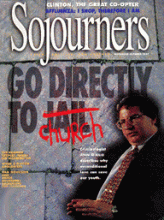I MUST ADMIT that I am perplexed by the recent article on the ecumenical movement ("All Together Now!" by Jim Wallis, May-June 1997). You characterize that the World Council of Churches’ "reasons for coming together had to do most with missions and service" when founded in 1948. Though the diakonal work of sharing and service has always maintained an important role in the ecumenical movement, I believe that the "goal of visible unity" as mentioned in the WCC’s present Common Understanding and Vision process is the primary reason for the WCC’s existence.
The most perplexing observation, however, is that your article made no mention of Orthodox Christianity. The modern "ecumenical movement" has not been "a relationship almost solely among mainstream Protestant churches" as you mistakenly suggest. Rather the Orthodox churches have been one of the major voices in the WCC that calls for Christians to work together. But then again, perhaps I understand what you call the "Real ecumenism of the last 25 years taking place in soup kitchens more than at the tables of theologians" to be a direct result of the last 50 years of the church working for visible unity in its life and work together, which includes all flavors of Christians at different times.
It should be the hope of all of us that the "rich mosaic" interconnecting us in the 21st century will be one where the quest for justice brings us closer to unity, and our unity will give us a louder prophetic voice to call for justice.
Read the Full Article
